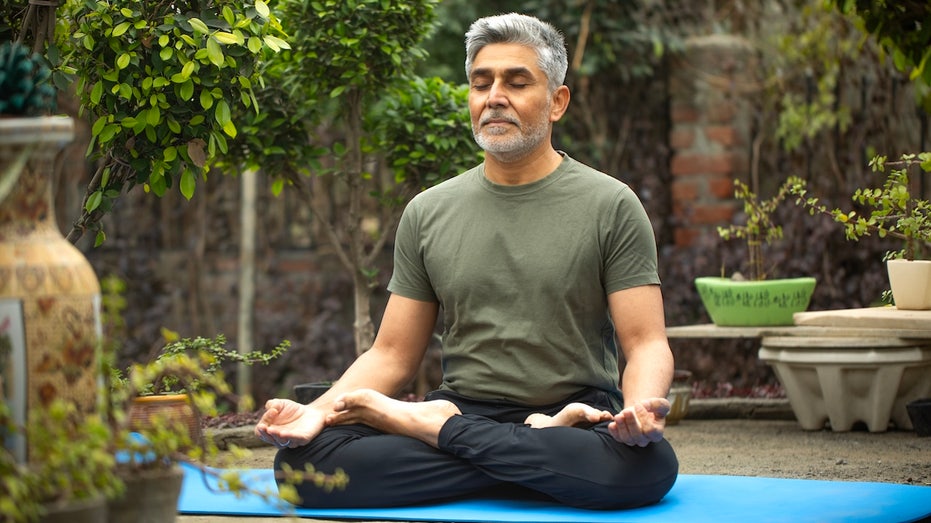Anti-aging benefits linked to one surprising health habit
Meditation has been linked to a slowdown in aging and reduction in stress. Biohacker Dave Asprey speaks with Fox News Digital about the health benefits of the practice.

Engaging in a long-term meditation practice could significantly alleviate stress and slow down aging, suggests a new study published in the journal Biomolecules.
Researchers from Maharishi International University (MIU), the University of Siegen, and the Uniformed Services University of the Health Sciences studied the effectiveness of transcendental meditation, which is a program where people silently repeat a mantra in their head to achieve deep relaxation.
"These results support other studies indicating that the transcendental meditation technique can reverse or remove long-lasting effects of stress," co-author Kenneth Walton, a senior researcher at MIU, told Fox News Digital.
"Lasting effects of stress are now recognized as causing or contributing to all diseases and disorders," he added.
The study included two groups of participants — one ranging from 20 to 30 years old and another ranging from 55 to 72. Half of the participants followed transcendental meditation and a control group did not.
For each participant, the researchers analyzed the expression of genes linked to inflammation and aging, according to a press release from MIU.
SECRETS OF LONGEVITY FROM THE WORLD'S 'BLUE ZONES'
They found that people who practiced transcendental meditation had lower expression of the genes associated with inflammation and aging.
"The lower expression of age-related genes … extend the findings of short-term studies indicating that these practices lead to healthy aging and more resilient adaptation to stress," Walton said in the release.
The researchers also analyzed cognitive function via EEG tests. Older practitioners of transcendental meditation were found to have faster processing speeds.
That group also received higher scores on the Brain Integration Scale (BIS), which is a comprehensive measure of cognitive performance.
"The findings around cognitive function are particularly exciting," said co-author Frederick Travis, PhD, head of faculty at Maharishi International University, in the release.
"Both younger and older TM practitioners showed higher scores on the BIS compared to non-meditators, while the older meditators performed on par with young controls," he stated.
COMMON SUPPLEMENT COULD HELP YOU LIVE LONGER, RESEARCH SUGGESTS
The third area of focus was hair cortisol and cortisone, which are steroid hormones that serve as biomarkers for long-term stress exposure and other health conditions.
The amount of active cortisol was higher for those who practiced transcendental meditation, the study found.
"Cortisol plays a critical role in the body’s response to stress, and chronically high cortisol levels are associated with a host of age-related health issues, in addition to cognitive decline," Walton said.
"The reduced cortisol-to-cortisone ratio in meditators suggests they have more adaptive reserve, more resilience, contributing to overall health and longevity."
HEALTHY EATING IN MIDDLE AGE HAS THIS KEY LONGEVITY BENEFIT
The main limitation in the years-long, cohort study was the lack of a placebo control group, according to Walton.
"These meditators practiced their techniques twice daily for many years, and the control subjects had no similar activity," he told Fox News Digital. "Also, most subjects spent their years in the same geographical location (Southeast Iowa in the U.S.)."
Biohacker Dave Asprey, author of the upcoming book "Heavily Meditated: The Fast Path to Remove Your Triggers, Dissolve Stress, and Activate Inner Peace," has spent 25 years studying meditation with shamans and gurus, and researching neuroscience.
He agrees that meditation helps to slow the aging process.
"It reduces stress — and the more stress you have that's not useful stress, like going to the gym or working hard, that shrinks your brain and makes you old," Asprey said during an on-camera interview with Fox News Digital. "Meditation has been shown in multiple studies to undo those problems."
The biohacker also refers to meditation as "weightlifting for the brain."
"Long-term meditators have brains that can make more electricity than someone who doesn't meditate — and their brains are more orderly."
Meditation could potentially slow and perhaps prevent some types of dementia, according to Asprey.
"There are studies showing that people who meditate are better at excreting toxins," he added.
Asprey emphasized that meditation starts not in the mind, but in the body.
For those who are just getting started, he recommends trying a body scan to calm the nervous system.
"For this, you breathe in deeply for four seconds and breathe out for eight seconds," he said. "Focus on your toes, then your ankles, then your calves, then your knees — and you slowly put all of your awareness in each part of your body."
CLICK HERE TO SIGN UP FOR OUR HEALTH NEWSLETTER
"Learning that meditation is an embodied practice versus a mental practice can shift it for everyone when they're just getting going."
Some studies have shown that the right form of meditation or breath work can have effects that exceed pharmaceuticals, according to Asprey.
"There are profound results that meditation can do much better than antidepressants," he said. "That said, if you're on a medication and you start meditating, you should tell your doctor and probably not go off the drugs without some support."
For more Health articles, visit www.foxnews.com/health
One of the biggest myths is that all meditation is the same or that all meditation is good for everyone, Asprey noted.
"The normal meditation that was designed for farmers isn’t going to work if you're a warrior — and it's okay if it doesn't work. It doesn't mean there's something wrong with you."
What's Your Reaction?

















































































